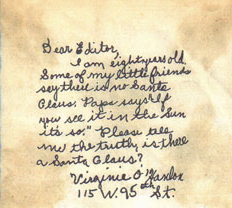
Hector Avalos has an article in the Ames Tribune on Christmas TV shows. He identifies that “puke” moment that hits me when I watch them:
On the more traditional end, we find “‘Twas the Night Before Christmas” (1974). The story features a family of mice, one of whose members is Albert, a precocious youngster who is a hard-nosed believer in science and a virtual atheist.
Albert wrote a letter calling Santa a fraudulent myth. As a result, Santa Claus retaliates by threatening to stay away from Albert’s town on Christmas Eve. When Albert’s father discovers what he has done, he tells Albert that he should trust his heart, not his head. After Albert apologizes, Santa forgives the town, and shows up on schedule.
The message emphasizes that faith and looking with “the heart” are actually better instruments to understand the world, and a purely scientific approach is narrow-minded.
– See more at: http://amestrib.com/opinion/hector-avalos-christmas-tv-shows-are-animated-religion#sthash.Ut29Bebj.dpuf
Yuck! I hate that sort of thing in those movies. They are so maudlin-good they are evil.
Then there’s the honest reply to that infamous letter . . . .
No, Virginia, there is no Santa Claus . . . . .
From Greta Christina’s blog:
No, Virginia, there is no Santa Claus. Love and generosity and devotion exist, and you know that they abound and give to your life its highest beauty and joy. But Santa Claus does not exist. He is a story made up by your parents. You should be extremely suspicious of anyone who tells you otherwise.
And far more importantly: You should be extremely suspicious of anyone who tells you that you’re a bad person for not believing things you have no good reason to think are true. You should be extremely suspicious of anyone who tells you that, in order to experience love and generosity and devotion, you have to believe in Santa Claus, or any other mythical being there’s no good evidence for. You should be extremely suspicious of anyone who tells you that “childlike faith” — i.e., believing things you have no good reason to think are true — is somehow in the same category as poetry and romance. You should be extremely suspicious of anyone who tells you that the world would be dreary without Santa Claus: that without Santa Claus, the light of childhood would be extinguished, we would have no enjoyment except in sense and sight, and existence would be intolerable. That is one seriously messed-up idea. . . .
What a wonderful world (and great movie!) that might be.
If you enjoyed this post, please consider donating to Vridar. Thanks!

Albert wrote a letter calling Santa a fraudulent myth. As a result, Santa Claus retaliates by threatening to stay away from Albert’s town on Christmas Eve. When Albert’s father discovers what he has done, he tells Albert that he should trust his heart, not his head. After Albert apologizes, Santa forgives the town, and shows up on schedule.
The message emphasizes that faith and looking with “the heart” are actually better instruments to understand the world, and a purely scientific approach is narrow-minded.
Bleccch!!!!
And it’s no wonder the USA is a badly-infected Christ-Psychosis infected nation! Because looking with the “heart” has led so many Americans of the Boomer, Joneser and GenX generations into damaging forms of “Evangelical Christianity.”